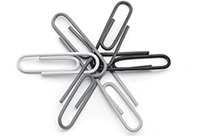
30
GENERATE JOY AND LAUGHTER
Energize Your Workplace
Do you want a bigger bonus, a boost in creative thinking, increased credibility, and greater opportunity? Start laughing. Humor at work is a serious business advantage. Check this out:
• Eighty-two percent of employees at Fortune 100 companies that were recognized as “great” places to work agree with the statement “I work in a fun organization.”
• All things being equal, 89 percent of CEOs believe they’d rather hire someone with a good sense of humor.
• Managers displaying a good sense of humor are given more opportunities in organizations than those who take themselves too seriously.
• People who can inject some lightheartedness, particularly in stressful positions, are viewed as being on top of things and in control, whether or not they actually are.
• The “funnier” an executive is, the higher the bonus.
• Supervisor use of humor is associated with enhanced subordinate work performance and workgroup cohesion.
Don’t panic. You don’t have to put this book down and run to a standup comedy class. Instilling joy and laughter at the office doesn’t require a pocket full of jokes or a stream of one-liners. It’s about relinquishing the relentless sense of urgency. Everything you do doesn’t have to be approached with grave importance, and you don’t have to always take yourself so seriously! Like the team at Nickelodeon used to say, “We are selling SpongeBob, not curing cancer. Why is everyone so tense?”
Upbeat atmospheres are associated with increased productivity and creativity. The more playful your culture, the easier it is to brainstorm ideas without the fear of being shot down.
Daniel Goleman wrote, “Laughter may be the shortest distance between two brains.” It builds cooperative bonds. Negotiations that begin with shared laughter more often result in mutually beneficial outcomes. Laughter is also a potent stress buster. If you are laughing or enjoying yourself, you can’t be feeling pressured or stressed. It’s like a mini-vacation.
Wharton professor Sigal Barsade has done extensive research revealing that employees are not emotionnal islands. We continuously spread our moods, receiving and being influenced by the affective states around us. The giggles of your colleague in the next cubicle can brighten your day. Neuroscientists have demonstrated that when we hear others laugh, mirror neurons are stimulated in our brains. We experience amusement as if we ourselves are laughing. Those who counsel that “work is no laughing matter” have it all wrong. Your mood affects my mood; my mood affects your mood. We all have a responsibility to insert a bit of levity. A lightness of being is contagious, and a key ingredient for success.
THIS IS FOR YOU IF
• It’s time to replace the b in job with a y (job → joy).
• You are very important.
• Brains are shut down and creativity is lacking.
• Everyone’s afraid. It’s tense. It’s no fun here.
TAKE ACTION
![]() Most emotional communication occurs through body language, facial expression, and tone. Change your facial expression to the one you would have if you were happy, even if you don’t feel it in the moment. It will improve your mood.
Most emotional communication occurs through body language, facial expression, and tone. Change your facial expression to the one you would have if you were happy, even if you don’t feel it in the moment. It will improve your mood.
![]() Greater self-awareness is associated with occupational success. Be the first to joke about your idiosyncrasies. Be the source of levity, rather than the font of office tension.
Greater self-awareness is associated with occupational success. Be the first to joke about your idiosyncrasies. Be the source of levity, rather than the font of office tension.
![]() If appropriate, consider introducing laughing yoga at work (https://laughteryoga.org/).
If appropriate, consider introducing laughing yoga at work (https://laughteryoga.org/).
![]() Have a board by the coffee machine and invite colleagues to post industry-related comics. No one laughs louder at a lawyer joke than a lawyer. Get the ball rolling. Post a few cartoons of your own.
Have a board by the coffee machine and invite colleagues to post industry-related comics. No one laughs louder at a lawyer joke than a lawyer. Get the ball rolling. Post a few cartoons of your own.
![]() You can’t mandate humor, but you can model it. Start small. Share a joke or a funny passage, make a play on words, or create an unexpected acronym for the latest project. If you get a smile from one person today, that’s success.
You can’t mandate humor, but you can model it. Start small. Share a joke or a funny passage, make a play on words, or create an unexpected acronym for the latest project. If you get a smile from one person today, that’s success.
![]() What if you’re just not funny? Or don’t find other people funny? That’s OK. Don’t force it. But don’t be a spoilsport by frowning at your chuckling teammates. Laugh with them or simply soak up their positive vibes.
What if you’re just not funny? Or don’t find other people funny? That’s OK. Don’t force it. But don’t be a spoilsport by frowning at your chuckling teammates. Laugh with them or simply soak up their positive vibes.
KEEP IN MIND
• Resist making inside jokes or laughing at another person’s expense.
• Building an inclusive community requires that everyone get the chance to be the subject of (appropriate) humor.
• Don’t overly rely on humor to deal with conflict or tension. Sometimes a serious intervention is necessary.
• Adding a smiley emoji after a terse comment does not make it funny.
• Not every form of humor is appropriate. Work is no place for locker room and bathroom humor or political, sexist, malicious, religious, homophobic, and xenophobic jokes.
